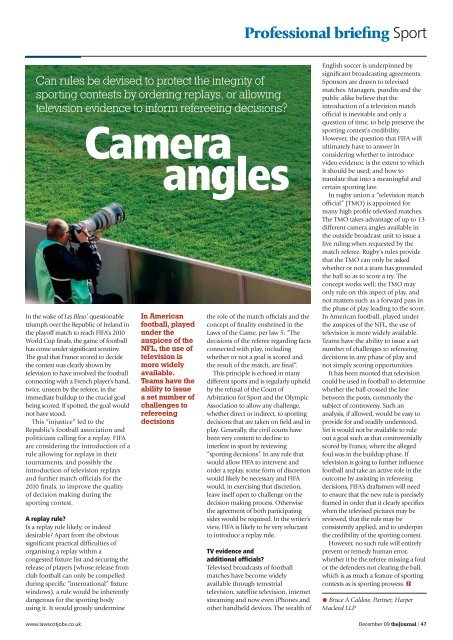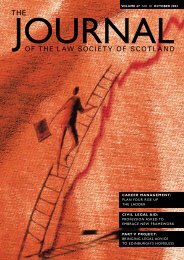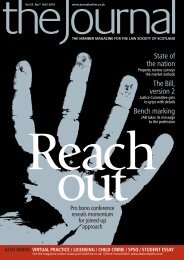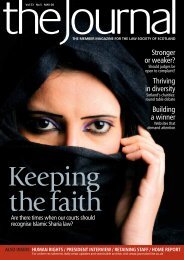Professional briefing - The Journal Online
Professional briefing - The Journal Online
Professional briefing - The Journal Online
You also want an ePaper? Increase the reach of your titles
YUMPU automatically turns print PDFs into web optimized ePapers that Google loves.
Can rules be devised to protect the integrity of<br />
sporting contests by ordering replays, or allowing<br />
television evidence to inform refereeing decisions?<br />
In the wake of Les Bleus’ questionable<br />
triumph over the Republic of Ireland in<br />
the playoff match to reach FIFA’s 2010<br />
World Cup finals, the game of football<br />
has come under significant scrutiny.<br />
<strong>The</strong> goal that France scored to decide<br />
the contest was clearly shown by<br />
television to have involved the football<br />
connecting with a French player’s hand,<br />
twice, unseen by the referee, in the<br />
immediate buildup to the crucial goal<br />
being scored. If spotted, the goal would<br />
not have stood.<br />
This “injustice” led to the<br />
Republic’s football association and<br />
politicians calling for a replay. FIFA<br />
are considering the introduction of a<br />
rule allowing for replays in their<br />
tournaments, and possibly the<br />
introduction of television replays<br />
and further match officials for the<br />
2010 finals, to improve the quality<br />
of decision making during the<br />
sporting contest.<br />
A replay rule?<br />
Is a replay rule likely, or indeed<br />
desirable? Apart from the obvious<br />
significant practical difficulties of<br />
organising a replay within a<br />
congested fixture list and securing the<br />
release of players (whose release from<br />
club football can only be compelled<br />
during specific “international” fixture<br />
windows), a rule would be inherently<br />
dangerous for the sporting body<br />
using it. It would grossly undermine<br />
www.lawscotjobs.co.uk<br />
Camera<br />
angles<br />
In American<br />
football, played<br />
under the<br />
auspices of the<br />
NFL, the use of<br />
television is<br />
more widely<br />
available.<br />
Teams have the<br />
ability to issue<br />
a set number of<br />
challenges to<br />
refereeing<br />
decisions<br />
<strong>Professional</strong> <strong>briefing</strong> Sport<br />
the role of the match officials and the<br />
concept of finality enshrined in the<br />
Laws of the Game, per law 5: “<strong>The</strong><br />
decisions of the referee regarding facts<br />
connected with play, including<br />
whether or not a goal is scored and<br />
the result of the match, are final”.<br />
This principle is echoed in many<br />
different sports and is regularly upheld<br />
by the refusal of the Court of<br />
Arbitration for Sport and the Olympic<br />
Association to allow any challenge,<br />
whether direct or indirect, to sporting<br />
decisions that are taken on field and in<br />
play. Generally, the civil courts have<br />
been very content to decline to<br />
interfere in sport by reviewing<br />
“sporting decisions”. In any rule that<br />
would allow FIFA to intervene and<br />
order a replay, some form of discretion<br />
would likely be necessary and FIFA<br />
would, in exercising that discretion,<br />
leave itself open to challenge on the<br />
decision making process. Otherwise<br />
the agreement of both participating<br />
sides would be required. In the writer’s<br />
view, FIFA is likely to be very reluctant<br />
to introduce a replay rule.<br />
TV evidence and<br />
additional officials?<br />
Televised broadcasts of football<br />
matches have become widely<br />
available through terrestrial<br />
television, satellite television, internet<br />
streaming and now even iPhones and<br />
other handheld devices. <strong>The</strong> wealth of<br />
English soccer is underpinned by<br />
significant broadcasting agreements.<br />
Sponsors are drawn to televised<br />
matches. Managers, pundits and the<br />
public alike believe that the<br />
introduction of a television match<br />
official is inevitable and only a<br />
question of time, to help preserve the<br />
sporting contest’s credibility.<br />
However, the question that FIFA will<br />
ultimately have to answer in<br />
considering whether to introduce<br />
video evidence, is the extent to which<br />
it should be used; and how to<br />
translate that into a meaningful and<br />
certain sporting law.<br />
In rugby union a “television match<br />
official” (TMO) is appointed for<br />
many high profile televised matches.<br />
<strong>The</strong> TMO takes advantage of up to 13<br />
different camera angles available in<br />
the outside broadcast unit to issue a<br />
live ruling when requested by the<br />
match referee. Rugby’s rules provide<br />
that the TMO can only be asked<br />
whether or not a team has grounded<br />
the ball so as to score a try. <strong>The</strong><br />
concept works well; the TMO may<br />
only rule on this aspect of play, and<br />
not matters such as a forward pass in<br />
the phase of play leading to the score.<br />
In American football, played under<br />
the auspices of the NFL, the use of<br />
television is more widely available.<br />
Teams have the ability to issue a set<br />
number of challenges to refereeing<br />
decisions in any phase of play and<br />
not simply scoring opportunities.<br />
It has been mooted that television<br />
could be used in football to determine<br />
whether the ball crossed the line<br />
between the posts, commonly the<br />
subject of controversy. Such an<br />
analysis, if allowed, would be easy to<br />
provide for and readily understood.<br />
Yet it would not be available to rule<br />
out a goal such as that controversially<br />
scored by France, where the alleged<br />
foul was in the buildup phase. If<br />
television is going to further influence<br />
football and take an active role in the<br />
outcome by assisting in refereeing<br />
decisions, FIFA’s draftsmen will need<br />
to ensure that the new rule is precisely<br />
framed in order that it clearly specifies<br />
when the televised pictures may be<br />
reviewed, that the rule may be<br />
consistently applied, and to underpin<br />
the credibility of the sporting contest.<br />
However, no such rule will entirely<br />
prevent or remedy human error,<br />
whether it be the referee missing a foul<br />
or the defenders not clearing the ball,<br />
which is as much a feature of sporting<br />
contests as is sporting prowess.<br />
Bruce A Caldow, Partner, Harper<br />
Macleod LLP<br />
December 09 the<strong>Journal</strong> / 47










